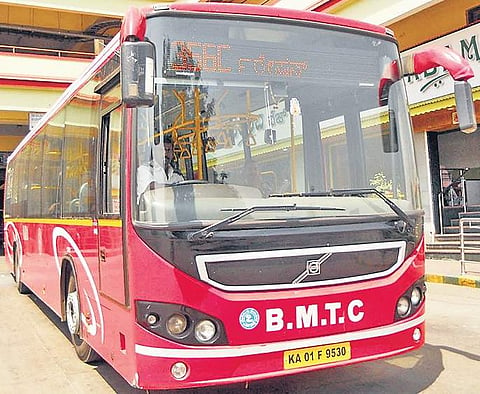

BENGALURU: A private bidder will be in the loop of running electric buses along with the State Transport Corporation, despite fears of job insecurity amongst its employees
The plan is to open up electric vehicles to private operators to provide services. With tenders floated for 350 electric buses (300-BMTC, 50 KSRTC) under the Gross Cost Contract (GCC) basis, the buses will be owned and operated by the private company.
In a GCC model, the operator is paid a specified sum to provide specific services for a fixed period. But the revenue would be collected by BMTC, with the mandatory retendering after the period expires.
Bidding for the buses will start in November, a senior BMTC official said on condition of anonymity. Interestingly, BMTC will only be giving out its conductors for the new buses, but the drivers will be recruited by the private operator, he said, adding that drivers would be trained by private operators, and the transport corporation will not see an issue of job security.
“Though all services will be done by them (the private operator), it will be under the government’s supervision,” the official explained.
Last month, Transport Minister Laxman Savadi had said that three private companies had approached him while one of them had proposed a 60:40 profit sharing (60 for BMTC and 40 for the private company) for electric buses.
“As of now, the government is looking at how to curb losses but there will be no privatisation of the corporation,” said the official. BMTC, with its 6,500 buses, suffered record losses of Rs 300 crore in 2018-19, besides a cumulative debt of about Rs 1,000 crore.
Under FAME-II (Faster Adoption and Manufacturing of Hybrid and Electric vehicles) which was sanctioned by the Centre, it mandates a GCC be signed between the respective state transport corporation and operator (successful bidder).
Anupam Agarwal, director of IT, Security and Vigilance, BMTC, said the corporation “is providing space for the private operator to perform its services”.
“Since the electric vehicle is new technology and there are chances of losses, we have opted for the GCC method. The goal, eventually, is to convert all buses to electric but nothing can be said as of now.”
However, Gaurav Gupta, principal secretary, transport department, rubbished all claims of privatisation. “There is no issue of privatisation and the matter stands at this.
"The workers may feel threatened by the new scheme but we will discuss the matter with the Union members,” he said, adding that no decision has been taken on privatisation.
The state union workers have expressed dismay on private operators being a part of the scheme. KN Umesh, vice-president of the state unit of Centre of Indian Trade Unions (CITU), said, “We are against private operators coming in.
If the corporation is at a loss, the government should invest in such schemes. But here, this changes the public sector concept of providing social service to a profit-making concept of private companies. What is the need of bringing in private-recruited drivers when we have our own?” he said.
Joint secretary of KSRTC Workers Federation, MS Suresh, said, “The state is hinting at introducing privatisation in the transport department. This will lead to job insecurity. The operators will only hire people on contract basis. Similarly, they can fire us whenever they want to. We are not sure what the government might do.”
GCC contracts have been introduced in states like Andhra Pradesh, Maharashtra and Tamil Nadu, but there too they have been facing opposition. Savadi was unavailable for comment for an update.